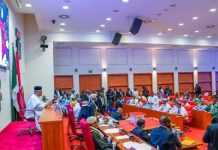The Nigeria Financial Intelligence Unit Bill (NFIU) bill recently passed by National Assembly may not get the President’s assent immediately. A top government official told newsmen that the Presidency was not convinced that moving the NFIU to the CBN was what the Egmont Group demanded from Nigeria as a condition for lifting its suspension.
The two chambers of NASS passed the new NFIU bill, which has formally transferred the controversial agency from the Economic and Financial Crimes Commission, EFCC, to the Central Bank of Nigeria, CBN, in a bid to prevent the country from being axed from Egmont Group, the international financial watchdog.
The meeting of the group takes place tomorrow, Monday, during which Nigeria’s suspension since July, 2017, is expected to be reviewed. There are concerns about the possible outcome of the review.
The official argued in a memo placed before the federal government that it was incorrect to say that Egmont suspended Nigeria because its NFIU was located within the EFCC.
The official said, “the truth is that Egmont group only raised some concerns in relation to established principles and guidelines and all that is needed for Nigeria to do in this situation is to address the issues strictly as observed, and incorporate the items as indicated as being deficient in the EFCC Act, by way of the passage of the EFCC Amendment bill and report to the agency.
“The bill proposing the amendment of the EFCC Act which has addressed the concerns of the Egmont Group has been submitted to the group’s Membership Support and Compliance Working Group, and it has made its observations and advised that some provisions contained in the EFCC Amendment bill be made clearer.
“It is pertinent to note that if this is done as pointed out by the agency, the suspension by Egmont Group will automatically be lifted at the same plenary without recourse to any other issue.
“But if Nigeria chooses to tow the line otherwise not suggested by the Egmont Group and decides to create a new FIU, as being proposed in the NFIA bill and relocates the FIU to the Central Bank or any other entity, the Egmont Group may consider this as a fundamental change in the structure of the FIU and the resultant effect may be an automatic expulsion, which may further subject Nigeria to the process of reapplication for membership, under the revised Egmont Group membership procedure adopted in 2014.
“It will therefore not be proper to submit to the Egmont Group an entirely different law for consideration, as against what is already before them. Any attempt to do this will not only ridicule Nigeria before the international community, but Nigeria will be viewed as a very unserious, insincere and irresponsive country.
“The Germany experience should guide our decision. The German FIU was expelled from the Egmont Group in January 2017 on the grounds that there was a fundamental change in its structure by relocating the FIU from the German Police to the Customs.
‘It is for these reasons that when the bill comes to the Presidency, it would be thoroughly examined to determine whether its functions are repeated in any existing law in Nigeria and if indeed it will bring about the needed change, before the president can sign it into law.
“Additionally, we need to find out if CBN has the institutional capacity to run an NFIU and if we are not convinced, the bill would not be assented,” the official said.
Source: Vanguard












